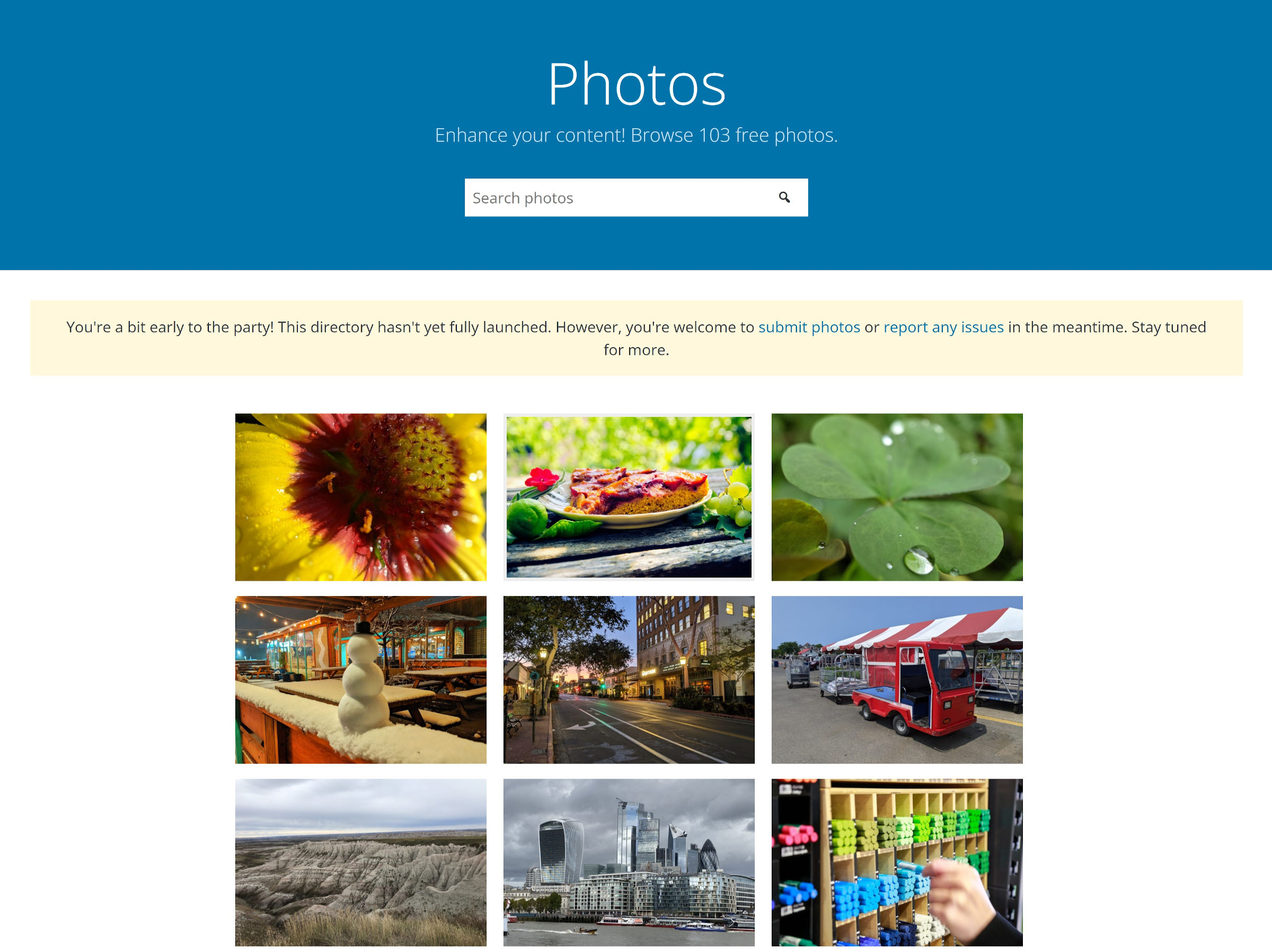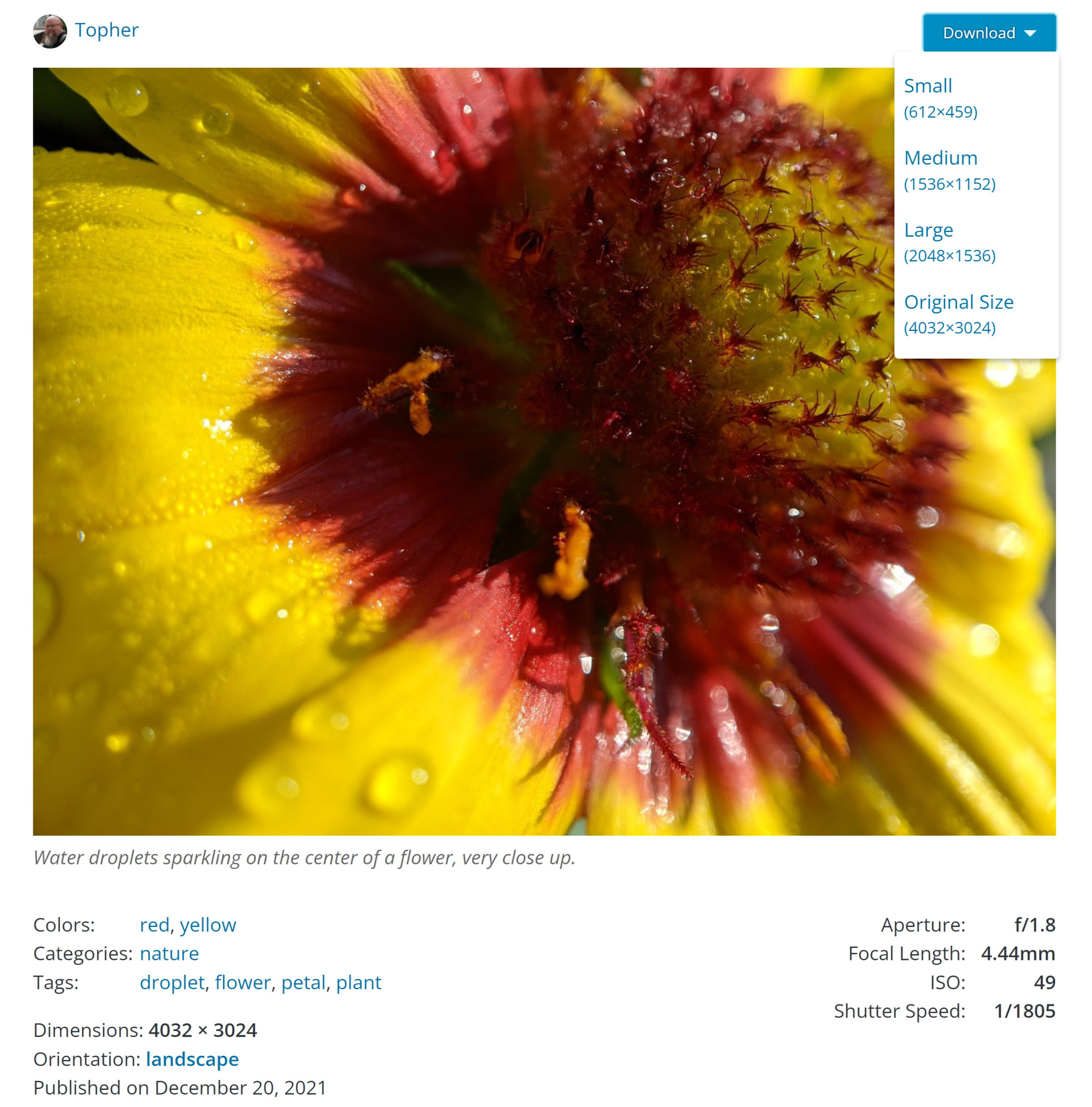
In last week’s annual State of the Word address, WordPress project lead Matt Mullenweg announced the WordPress.org photo directory. Officially, it has not yet “fully launched.” However, it is live on the site, and anyone with an account can submit their photos.
Thus far, the directory has 103 submissions and are under the CC0 license. Unfortunately, there is only a single photo of a house cat. Perhaps I will need to contribute to the commons that this project has made possible.
This is a separate project from Openverse, a search engine for finding open-source media, launched before the State of the Word event. Eventually, images from WordPress Photos should be discoverable via the Openverse search.
Earlier this year, I was already envisioning what Openverse could be. However, what I really wanted was a WordPress photo directory. Actually, I wanted a WordPress media directory, but starting with images is easier:
Openverse must become more than a media search engine. It needs to be a project where the Average Joe can upload a nice nature picture he took over the weekend barbecue. A place where Average Jane can share a video clip of the ocean waves hitting the shoreline from her beach trip. And a place where professionals can pay it forward to the world.
When Jeff Chandler of WP Mainline shared his first photo, I quickly turned it into a block pattern that wrapped the image in a wooden frame (pattern and image links available via Gist). When the WordPress pattern directory opens its submission process, I would love to submit it or some variation.

My customization was not anything special. I wanted to showcase how vital CC0 photos are to those building WordPress extensions like patterns and themes. Having a reliable image resource is invaluable to our creator community. It also gives non-developers another way to contribute to the project.
I also like seeing the faces of people I know listed in the directory. It very much feels like a photo directory made by the people of WordPress. One of my favorites is this one from Topher DeRosia (he has already submitted five):

Single image posts provide additional photo information, categories, and tags. Each photo also has multiple download sizes.
The front page and search could still use a little work. Being able to at least search for images based on orientation (e.g., landscape vs. portrait) would be helpful. A nav menu with all of the categories would be handy too.
The Space Needed Disruption
The stock imagery space needed to be turned upside down. More and more, creators from the WordPress community have stepped away from some of the sites they once loved.
Unsplash. Pexels. Pixabay. They have all had an opportunity to become the most significant open-source photo website in the world. They are places for snagging a quick photograph for free. And, for the most part, they have allowed people to give back with their art.
However, these stock photo sites that previously distributed images in the public domain began adding restrictive licensing terms. It started with Unsplash in 2017. Pexels soon followed, and Pixabay was in lock-step with the others by 2019.
Most of these restrictions disallow users to build similar “collection sites” with those same images, essentially creating a competing service. However, they all have other restrictive terms on selling photos, especially unaltered ones. Note: Pexels still allows its contributors to choose between the Pexels License and CC0 (public domain).
Many photo-sharing sites built their empires on top open source, only to turn their backs on it down the road. The open-source spirit embraces competing websites. The art itself is meant to be shared. That is kind of the point. To be fair, the aforementioned were not the only such sites. They were just the most prevalent in the WordPress ecosystem.
WordPress theme authors were often champions of those sites in years prior. However, they saw service after service disappear before their eyes as they were banned from use on WordPress.org. Themers could not distribute the images because the users who downloaded them would not have the same freedoms as promised by the GPL. It was a loss for open-source.
Now that WordPress has a pattern directory, the issue has become more evident. In the coming months and years, creators will need high-quality photos to showcase their patterns.
The easiest path was to leverage the millions of people who use WordPress and build our own thing. WordPress Photos could very well become the de facto standard of open photos on the web, and that is something we should all welcome with open arms.
The project is necessary. WordPress.org has the resources to make something remarkable: a photo-sharing site that is 100% open and will never change.
